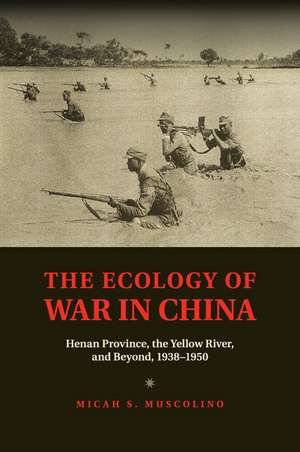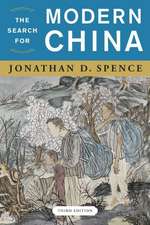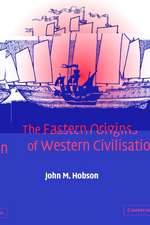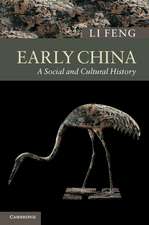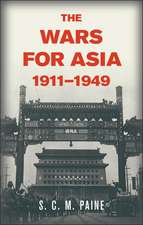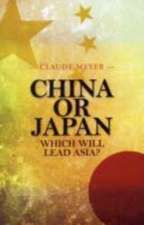The Ecology of War in China: Henan Province, the Yellow River, and Beyond, 1938–1950: Studies in Environment and History
Autor Micah S. Muscolinoen Limba Engleză Paperback – 25 mai 2016
| Toate formatele și edițiile | Preț | Express |
|---|---|---|
| Paperback (1) | 226.35 lei 6-8 săpt. | |
| Cambridge University Press – 25 mai 2016 | 226.35 lei 6-8 săpt. | |
| Hardback (1) | 695.06 lei 6-8 săpt. | |
| Cambridge University Press – 14 dec 2014 | 695.06 lei 6-8 săpt. |
Din seria Studies in Environment and History
-
 Preț: 137.74 lei
Preț: 137.74 lei -
 Preț: 188.70 lei
Preț: 188.70 lei -
 Preț: 234.83 lei
Preț: 234.83 lei -
 Preț: 156.89 lei
Preț: 156.89 lei -
 Preț: 204.55 lei
Preț: 204.55 lei -
 Preț: 147.64 lei
Preț: 147.64 lei -
 Preț: 243.02 lei
Preț: 243.02 lei -
 Preț: 201.67 lei
Preț: 201.67 lei - 14%
 Preț: 771.56 lei
Preț: 771.56 lei -
 Preț: 231.54 lei
Preț: 231.54 lei -
 Preț: 191.12 lei
Preț: 191.12 lei -
 Preț: 239.72 lei
Preț: 239.72 lei -
 Preț: 231.59 lei
Preț: 231.59 lei -
 Preț: 200.99 lei
Preț: 200.99 lei -
 Preț: 206.52 lei
Preț: 206.52 lei -
 Preț: 199.05 lei
Preț: 199.05 lei -
 Preț: 431.15 lei
Preț: 431.15 lei -
 Preț: 322.04 lei
Preț: 322.04 lei -
 Preț: 204.48 lei
Preț: 204.48 lei -
 Preț: 299.23 lei
Preț: 299.23 lei -
 Preț: 332.81 lei
Preț: 332.81 lei -
 Preț: 239.55 lei
Preț: 239.55 lei -
 Preț: 225.79 lei
Preț: 225.79 lei -
 Preț: 285.93 lei
Preț: 285.93 lei -
 Preț: 270.25 lei
Preț: 270.25 lei -
 Preț: 275.85 lei
Preț: 275.85 lei -
 Preț: 323.05 lei
Preț: 323.05 lei -
 Preț: 208.68 lei
Preț: 208.68 lei - 11%
 Preț: 432.64 lei
Preț: 432.64 lei -
 Preț: 252.69 lei
Preț: 252.69 lei -
 Preț: 278.72 lei
Preț: 278.72 lei -
 Preț: 272.97 lei
Preț: 272.97 lei - 11%
 Preț: 528.82 lei
Preț: 528.82 lei - 14%
 Preț: 756.70 lei
Preț: 756.70 lei -
 Preț: 264.09 lei
Preț: 264.09 lei -
 Preț: 440.76 lei
Preț: 440.76 lei
Preț: 226.35 lei
Nou
Puncte Express: 340
Preț estimativ în valută:
43.32€ • 45.06$ • 35.76£
43.32€ • 45.06$ • 35.76£
Carte tipărită la comandă
Livrare economică 14-28 aprilie
Preluare comenzi: 021 569.72.76
Specificații
ISBN-13: 9781107417595
ISBN-10: 1107417597
Pagini: 310
Ilustrații: 19 b/w illus. 9 maps 2 tables
Dimensiuni: 150 x 230 x 18 mm
Greutate: 0.46 kg
Editura: Cambridge University Press
Colecția Cambridge University Press
Seria Studies in Environment and History
Locul publicării:New York, United States
ISBN-10: 1107417597
Pagini: 310
Ilustrații: 19 b/w illus. 9 maps 2 tables
Dimensiuni: 150 x 230 x 18 mm
Greutate: 0.46 kg
Editura: Cambridge University Press
Colecția Cambridge University Press
Seria Studies in Environment and History
Locul publicării:New York, United States
Cuprins
Introduction; 1. A militarized river: the 1938 Yellow River flood and its aftermath; 2. Stories of survival: refugee migration and ecological adaptation; 3. Military metabolism and the Henan famine of 1942–3; 4. Against the flow: hydraulic instability and ecological exhaustion; 5. The ecology of displacement: social and environmental effects of refugee migration; 6. The land needs the people, the people need the land: beginnings of postconflict recovery; 7. Reconstruction and revolution; Conclusion.
Recenzii
'This is a riveting study of one of modern history's worst war-induced disasters. In 1938 the Yellow River was turned into a weapon of strategic defense, its waters let loose on the North China plain by Chinese forces resisting the Japanese invasion. This consummate work shows the evolution of the disaster and lays out its ghastly human and ecological effects. It is a pioneering combination of environmental history and Chinese history.' Diana Lary, University of British Columbia
'In this brilliantly conceptualized work Muscolino draws on the memories of the displaced as well as the records of the river to tell an environmental history of the Yellow River, granting the latter its full agency in the shaping of modern Chinese history.' Wen-hsin Yeh, Richard H. and Laurie C. Morrison Chair Professor in History, University of California, Berkeley
'Conceptualizing the relationship between armies and environment in terms of energy flows, Micah Muscolino provides us with a startlingly new and rich way to think about the relationship between war and environment.' Hans van de Ven, Director in Oriental Studies, St Catharine's College, University of Cambridge
'The Ecology of War in China is an ambitious book that delivers an intense vision of the tremendous hardships faced by the people and environment of the central Chinese province of Henan throughout a dozen years of Anti-Japanese Resistance, widespread famine, civil war, and, finally, recovery … Muscolino does a masterful job of demonstrating the pivotal role that the Yellow River and the larger environment played in Chinese history.' Norman Smith, The Journal of Interdisciplinary History
'Micah Muscolino already has a strong reputation as a pioneering scholar in the field of China's Republican-era environmental history. His new book makes another major contribution to that field. … The Ecology of War in China is a valuable addition to the literature on the environmental destructiveness of warfare. It must count as one of the most rigorously researched, analytically sophisticated, and strongest studies we have of the causes and consequences of an environmental disaster in twentieth-century China. It deserves to be widely read.' Pauline Keating, The China Journal
'… in an age in which human decisions - often based on the short-term pursuit of power - may shape even the broadest long-standing background conditions of human societies, Muscolino's account of unintended consequences, incomplete reversibility, and destabilized environments is also a story of more than just historical interest.' Kenneth Pomeranz, Cross-Currents: East Asian History and Culture Review
'This is a work of painstaking local history, illustrated with numerous detailed maps of the shifting Yellow River flood, and gripping photographs from the time. Archival sources and local observers provide telling details and useful statistics. … Muscolino is an environmental historian, a path-breaker in this discipline in the China field. He forces old-fashioned historians like me to think in new ways, which is certainly both necessary and useful.' Joseph Esherick, Journal of Chinese History
'The Yellow River, China's second-longest waterway and Asia's third-longest, is not exactly a typical veteran of the Second World War (or, if you are Chinese, of the 'War of Resistance against Japan'). As Micah S. Muscolino ably demonstrates, the Yellow River nevertheless did literally play a central role as 'an actor' in the second Sino-Japanese War (1937–1945). In its attention to postwar policies and legacies, the book begins to fill a gap in the growing literature on 'war and the environment' by looking beyond the immediate effects of military operations. Overall, The Ecology of War in China is a powerful demonstration of the synergy between people and nature that both destroys and restores.' David Bello, The American Historical Review
'The Ecology of War in China is a superbly researched and tightly argued text on the environmental consequences of the Pacific War in China. … the focus on the first elements of the metabolic cycle, the consumption of energy, in all its myriad forms and consequences, is a very useful construct to disentangle the mutually supporting and complex impacts that militaries and military action had on the physical and social landscape in the lower Yellow River valley.' David Pietz, Environmental History
'Muscolino describes vividly the effects of this state-induced inundation, which sacrificed the livelihoods of millions of farmers in the interests of state security and once again failed to stop the foreign invader. He describes the aftermath of the river flood, during the time when the river continued to shift course, refugees covered the landscape, and military operations continued. Muscolino also vividly narrates the experience of refugees, laborers, and farmers, and he describes the survival strategies they used to withstand the blows of armies, sand, and water. Such extensive militarization of water, land, and human labor laid the ominous foundations for the mass mobilizations of the PRC during the 1950s and 1960s.' Peter Perdue, Harvard Journal of Asiatic Studies
'This is a rich empirical study of a complex subject matter. It is essential for understanding the environmental impact of the Second Sino-Japanese War and the civil war on North China.' Sravani Biswas, H-War
'In this brilliantly conceptualized work Muscolino draws on the memories of the displaced as well as the records of the river to tell an environmental history of the Yellow River, granting the latter its full agency in the shaping of modern Chinese history.' Wen-hsin Yeh, Richard H. and Laurie C. Morrison Chair Professor in History, University of California, Berkeley
'Conceptualizing the relationship between armies and environment in terms of energy flows, Micah Muscolino provides us with a startlingly new and rich way to think about the relationship between war and environment.' Hans van de Ven, Director in Oriental Studies, St Catharine's College, University of Cambridge
'The Ecology of War in China is an ambitious book that delivers an intense vision of the tremendous hardships faced by the people and environment of the central Chinese province of Henan throughout a dozen years of Anti-Japanese Resistance, widespread famine, civil war, and, finally, recovery … Muscolino does a masterful job of demonstrating the pivotal role that the Yellow River and the larger environment played in Chinese history.' Norman Smith, The Journal of Interdisciplinary History
'Micah Muscolino already has a strong reputation as a pioneering scholar in the field of China's Republican-era environmental history. His new book makes another major contribution to that field. … The Ecology of War in China is a valuable addition to the literature on the environmental destructiveness of warfare. It must count as one of the most rigorously researched, analytically sophisticated, and strongest studies we have of the causes and consequences of an environmental disaster in twentieth-century China. It deserves to be widely read.' Pauline Keating, The China Journal
'… in an age in which human decisions - often based on the short-term pursuit of power - may shape even the broadest long-standing background conditions of human societies, Muscolino's account of unintended consequences, incomplete reversibility, and destabilized environments is also a story of more than just historical interest.' Kenneth Pomeranz, Cross-Currents: East Asian History and Culture Review
'This is a work of painstaking local history, illustrated with numerous detailed maps of the shifting Yellow River flood, and gripping photographs from the time. Archival sources and local observers provide telling details and useful statistics. … Muscolino is an environmental historian, a path-breaker in this discipline in the China field. He forces old-fashioned historians like me to think in new ways, which is certainly both necessary and useful.' Joseph Esherick, Journal of Chinese History
'The Yellow River, China's second-longest waterway and Asia's third-longest, is not exactly a typical veteran of the Second World War (or, if you are Chinese, of the 'War of Resistance against Japan'). As Micah S. Muscolino ably demonstrates, the Yellow River nevertheless did literally play a central role as 'an actor' in the second Sino-Japanese War (1937–1945). In its attention to postwar policies and legacies, the book begins to fill a gap in the growing literature on 'war and the environment' by looking beyond the immediate effects of military operations. Overall, The Ecology of War in China is a powerful demonstration of the synergy between people and nature that both destroys and restores.' David Bello, The American Historical Review
'The Ecology of War in China is a superbly researched and tightly argued text on the environmental consequences of the Pacific War in China. … the focus on the first elements of the metabolic cycle, the consumption of energy, in all its myriad forms and consequences, is a very useful construct to disentangle the mutually supporting and complex impacts that militaries and military action had on the physical and social landscape in the lower Yellow River valley.' David Pietz, Environmental History
'Muscolino describes vividly the effects of this state-induced inundation, which sacrificed the livelihoods of millions of farmers in the interests of state security and once again failed to stop the foreign invader. He describes the aftermath of the river flood, during the time when the river continued to shift course, refugees covered the landscape, and military operations continued. Muscolino also vividly narrates the experience of refugees, laborers, and farmers, and he describes the survival strategies they used to withstand the blows of armies, sand, and water. Such extensive militarization of water, land, and human labor laid the ominous foundations for the mass mobilizations of the PRC during the 1950s and 1960s.' Peter Perdue, Harvard Journal of Asiatic Studies
'This is a rich empirical study of a complex subject matter. It is essential for understanding the environmental impact of the Second Sino-Japanese War and the civil war on North China.' Sravani Biswas, H-War
Notă biografică
Descriere
This book explores the interplay between war and the environment in Henan Province from 1938–50.
